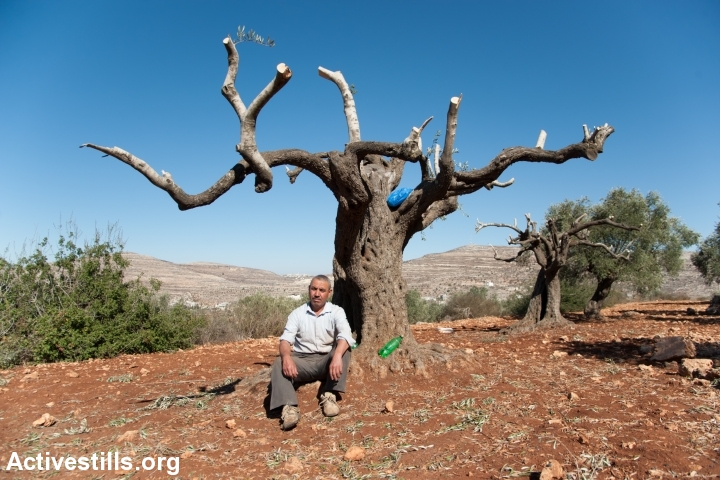When violent hate crimes happen so often they become a non-story.

Imagine a series of attacks on shops and businesses in your city. Every night, a gang of hooligans breaks windows, damages goods and sets fire to a different store.
Now imagine that this same gang only targets businesses owned by a specific group of people – say, a chain of local stores owned and operated by blacks or Jews. The attacks go on for years and only worsen with time. If the store owner happens to be there, he or she is beaten and left bleeding at the front door.
In the United States and Europe these kind of acts would be deemed “hate crimes.” In Israel, the targeting of, say, Jewish-owned businesses would be decried as an act of “terror” by politicians and the press. If the problem persists, it may even become an internationally-recognized issue. Petitions will be signed. Ambassadors will be called to explain. Communities will mobilize.
For a Palestinian farmer, the olive grove is his business.
The past several years have seen thousands of trees burned, cut down or damaged in dozens of incidents, including “price tag attacks” – a form of vandalism or property destruction, sometimes carried out in protest of a certain governmental decision that the perpetrators don’t like, and sometimes for no reason other than hate. Farmers have been shot at, beaten, and have had their cars burned. Some have suffered severe injuries, others have lost the little property they own. For almost everyone, the yearly olive harvest – taking place this time of year – has become a time of deep fear and anxiety.
According to Rabbis for Human Rights, nearly 2,000 Palestinian olive trees have been either uprooted or burned across the West Bank in recent months alone. Palestinians and their Israeli and international allies are routinely attacked while attempting to harvest olives. A recent video posted by my colleague Michael Omer-Man shows settlers violently beating a Palestinian olive harvester with a metal pole.
Just yesterday, Amira Hass reported in Haaretz about a leaked document that describes 16 separate incidents in which Israeli settlers vandalized or set fire to Palestinian olive groves during the months of September and October. Her report suggests that not only did the government and army fail to act against those attacks – they decided to keep knowledge of the attacks secret.
According to Yesh Din, only 8.5 percent of investigation files between 2005-2013 ended in the indictment of Israelis suspected of harming Palestinians and their property.
It seems that the growing number of attacks has not caused Israeli authorities to respond. Actually, quite the opposite has happened: price tag attacks have become a “non-story” in the international media. When reference to the attacks is made, it often comes in the form of an exotic dispute taking place in some distant country but is never called out for what it is – an organized campaign of terror against a defenseless civilian population.
Why isn’t the targeting of Palestinian olive trees considered an act of terror, given that for many these trees are their livelihood? Surely the White House would issue a statement condemning a string of attacks on Jewish businesses in Tel Aviv, London or New York – so what makes Palestinians less worthy of our concern?
When it comes to Palestinian businesses, it seems that both the government and the mainstream media prefer to turn a blind eye. At worst, they purposefully hide the information from us.
It’s time to wake up to the reality in the West Bank and view these attacks on Palestinians and their livelihoods for what they are.
Read more:
For Israel’s police, settler violence is but a fantasy
WATCH: Masked settler beats Palestinian with metal pipe
Fact sheet: Israeli police fail to prosecute violence against Palestinians
PHOTOS: Settlers attack Palestinian olive pickers, damage trees

